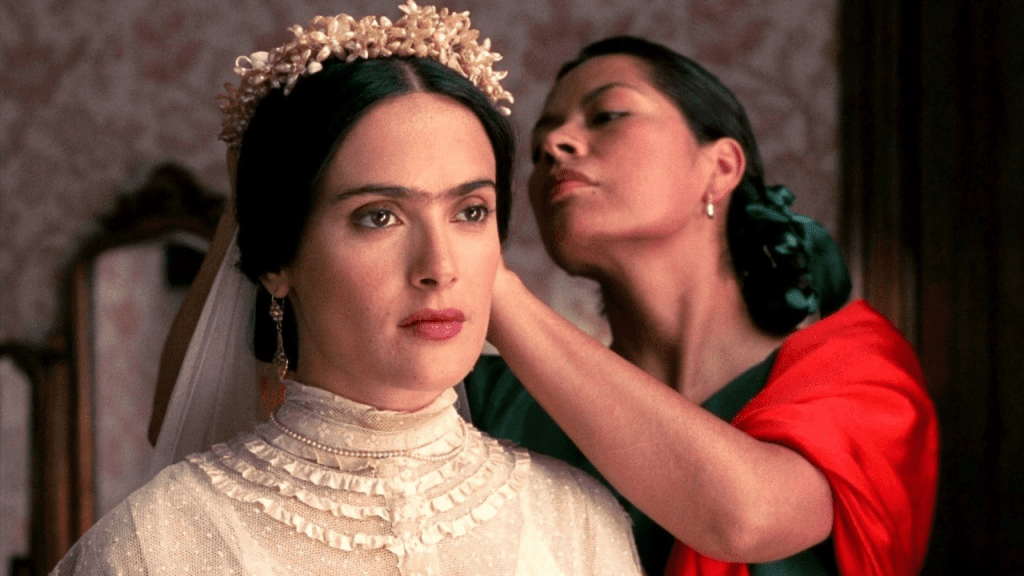
Salma Hayek has long been a beacon of talent and perseverance in Hollywood. Among her many acclaimed performances, her role as Frida Kahlo in the 2002 film Frida remains one of her most celebrated achievements. In this article, we explore the profound impact of Hayek’s performance, the film’s artistic brilliance, and its lasting legacy.
Directed by Julie Taymor, Frida chronicles the life of Frida Kahlo, a renowned Mexican artist whose works and personal story have captivated generations. The film delves into Kahlo’s struggles with pain, her passionate relationship with Diego Rivera, and her revolutionary artistic vision. Taymor’s innovative direction blends surrealism with traditional biographical storytelling, creating a visual masterpiece that mirrors Kahlo’s unique perspective.
Salma Hayek played an instrumental role in bringing Frida to the screen. As both the lead actress and a producer, she championed the project, ensuring that Kahlo’s story was portrayed with authenticity and respect. Hayek’s commitment to the film’s success was a driving force behind its creation.
Hayek’s portrayal of Frida Kahlo is nothing short of extraordinary. To embody Kahlo, she underwent a dramatic physical transformation, adopting the artist’s distinctive features and style. More importantly, Hayek captured the emotional essence of Kahlo—her fiery spirit, vulnerability, and resilience—with unparalleled depth.
Her performance was deeply rooted in her understanding of Kahlo’s life and art. Hayek studied Kahlo’s works, personal letters, and historical context to deliver a portrayal that felt authentic and multidimensional. Her efforts earned her an Academy Award nomination for Best Actress, a milestone in her career that highlighted her remarkable talent.
Frida stands out for its stunning visuals and compelling soundtrack. Julie Taymor’s direction incorporates elements of Kahlo’s art into the film, using surreal sequences to reflect the artist’s inner world. The vibrant colors and symbolic imagery bring Kahlo’s paintings to life, creating a deeply immersive experience for viewers.

Elliot Goldenthal’s award-winning score enhances the film’s emotional resonance. By blending traditional Mexican music with original compositions, the soundtrack complements the narrative’s cultural and emotional themes.
At its core, Frida is a celebration of Frida Kahlo’s legacy. The film portrays her as a trailblazer whose art challenged societal norms and explored themes of identity, pain, and resilience. Through Hayek’s performance, audiences are given an intimate look at Kahlo’s life, from her personal struggles to her groundbreaking achievements.
The film also highlights Kahlo’s relationship with Diego Rivera, played by Alfred Molina. Their complex dynamic is portrayed with nuance, capturing the passion and tension that defined their bond.

Frida was met with critical acclaim upon its release. The film received six Academy Award nominations, winning two for Best Original Score and Best Makeup. Hayek’s nomination for Best Actress marked a historic moment, celebrating her as one of the few Latina actresses to receive such recognition.
Beyond its accolades, Frida has left a lasting cultural impact. The film introduced Frida Kahlo’s story to a global audience, inspiring renewed interest in her art and legacy. It also underscored the importance of diverse representation in Hollywood, paving the way for future stories centered on underrepresented voices.

Decades after its release, Frida remains a touchstone in biographical filmmaking. Its themes of resilience, creativity, and individuality continue to resonate with audiences, inspiring them to embrace their unique identities and overcome challenges. Salma Hayek’s portrayal of Kahlo stands as a testament to the transformative power of storytelling and the enduring influence of trailblazing women.
Salma Hayek’s journey with Frida exemplifies her passion for meaningful storytelling and her dedication to celebrating diverse voices. Her portrayal of Frida Kahlo is a tribute to an artist whose work transcends time and continues to inspire. As we reflect on this cinematic masterpiece, it is clear that Frida remains a shining example of Hayek’s artistry and influence.




